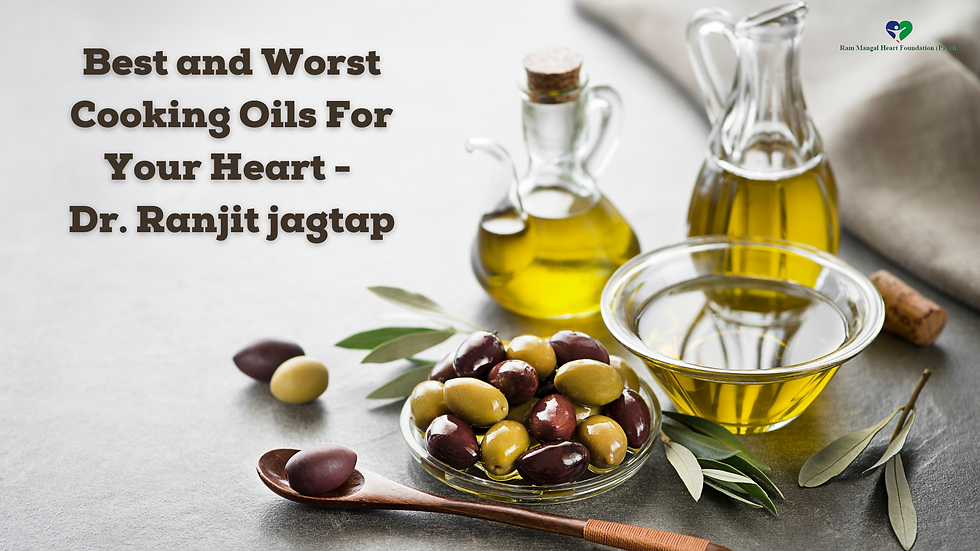Best and Worst Cooking Oils For Your Heart - Dr. Ranjit jagtap
- drranjitjagdap
- Sep 13, 2023
- 4 min read

Cooking oils are an essential part of our daily culinary endeavors. They play a crucial role in determining the taste and texture of our dishes, but their impact on our health, particularly our heart health, should not be overlooked. Some oils can be a boon for your heart, while others might contribute to heart-related problems. In this blog, we will explore the best and worst cooking oils for your heart, helping you make informed choices for a healthier lifestyle.
The Best Cooking Oils For Heart Health
Olive Oil: Olive oil is often hailed as the gold standard for heart-healthy cooking oils. It is rich in monounsaturated fats, which have been linked to reduced heart disease risk. Additionally, olive oil contains antioxidants, such as polyphenols, that help protect your heart by reducing inflammation and improving cholesterol levels. Extra virgin olive oil, in particular, is less processed and retains more of these beneficial compounds.
Avocado Oil: Avocado oil is another excellent choice for heart health. Like olive oil, it is high in monounsaturated fats. It also contains potassium, which can help regulate blood pressure. The mild flavor of avocado oil makes it a versatile option for various cooking methods.
Canola Oil: Canola oil is low in saturated fat and high in heart-healthy monounsaturated and polyunsaturated fats. It's also a good source of omega-3 fatty acids, which are known to reduce the risk of heart disease.
Canola oil has a neutral flavor, making it suitable for a wide range of dishes.
Flaxseed Oil: Flaxseed oil is a potent source of alpha-linolenic acid (ALA), an omega-3 fatty acid. Omega-3s are essential for heart health as they can lower blood pressure and reduce inflammation. However, flaxseed oil is heat-sensitive, so it's best used as a finishing oil for salad dressings or drizzled over cooked dishes says Dr. Ranjit jagtap news.
Walnut Oil: Walnut oil is another source of omega-3 fatty acids, specifically alpha-linolenic acid (ALA). It has a rich, nutty flavor that can enhance the taste of salads and baked goods. However, like flaxseed oil, it is sensitive to heat, so it's best used as a finishing touch.
Cooking Oils to Limit or Avoid for Heart Health
Saturated Fats: Cooking oils high in saturated fats should be limited. These fats can raise your LDL (bad) cholesterol levels, increasing the risk of heart disease. Oils like coconut oil and palm oil are high in saturated fats and should be used sparingly.
Trans Fats: Trans fats are artificial fats that have been linked to a higher risk of heart disease. They can raise your LDL cholesterol and lower your HDL (good) cholesterol levels. Thankfully, many countries have banned or significantly reduced the use of trans fats in commercial food products. Be cautious when consuming processed foods, as some may still contain trans fats.
Corn Oil: Corn oil is relatively high in omega-6 fatty acids, which, when consumed in excess, can promote inflammation and potentially contribute to heart disease. While small amounts of omega-6s are necessary for health, the typical Western diet tends to be imbalanced in favour of omega-6s. Therefore, it's wise to use corn oil in moderation.
Peanut Oil: Peanut oil has a moderate amount of saturated fat and omega-6 fatty acids. While it's not the worst choice, it's best to use it sparingly and opt for oils higher in heart-healthy fats when possible, says Dr. Ranjit jagtap.
Palm Oil: Palm oil is high in saturated fat and often found in processed foods, including some baked goods and snack items. Due to its impact on cholesterol levels, it's best to limit your consumption of palm oil.
Tips for Cooking Heart-Healthy Meals
Now that you know which cooking oils are best and worst for your heart, here are some tips to help you make heart-healthy meals:
Use olive oil for sautéing and salad dressings: Extra virgin olive oil is a great choice for most cooking needs. Its rich flavour can enhance salads, and it stands up well to moderate heat when sautéing.
Choose avocado or canola oil for high-heat cooking: When you need to cook at higher temperatures, avocado and canola oils are stable and won't break down easily.
Incorporate omega-3 rich oils: Flaxseed and walnut oils can be a part of your diet, but avoid heating them. Use them as finishing oils for added flavor and nutrition.
Read food labels: Be vigilant about reading food labels to identify hidden sources of unhealthy fats like trans fats and excessive saturated fats.
Diversify your fats: Rather than relying solely on one cooking oil, consider using a variety of heart-healthy oils in your cooking to ensure a balanced intake of fatty acids.
Conclusion
Choosing the right cooking oil can significantly impact your heart health. Opting for heart-healthy oils like olive, avocado, and canola oil can be a simple yet effective step in reducing your risk of heart disease. As per Dr. Ranjit jagtap clinic Conversely, limiting or avoiding oils high in saturated fats and trans fats, such as coconut and palm oil, is equally important. By making informed choices in your kitchen, you can promote a healthier heart and enjoy delicious meals at the same time. Remember, a healthy heart begins with the right cooking oil.



Comments